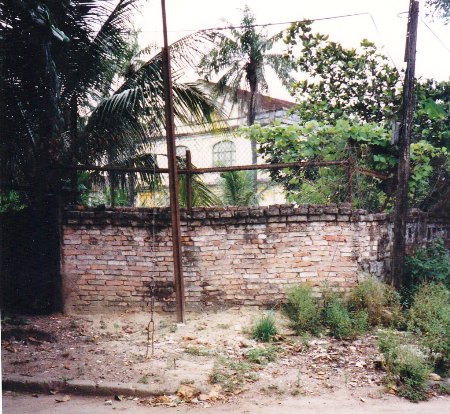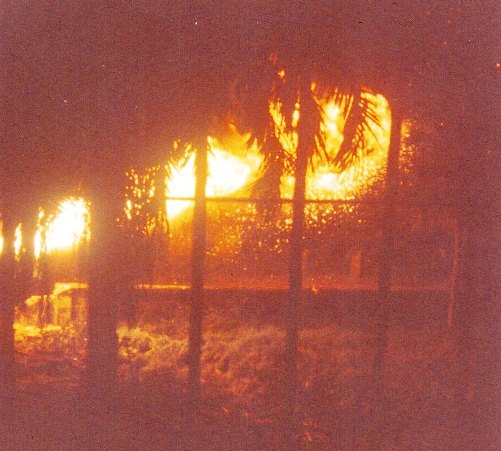| Ken and Bill's Excellent Adventure |
| I. The House in Hue, 1968 The weapon that got Kenny and me was an RPG, a rocket-propelled grenade. |
|
You’ve probably seen RPGs in news footage of Afghan mujahedeen or Taliban fighters. The launcher is a long thin tube that the gunner rests on his shoulder like a bazooka, and the projectile sticks out the front end of the tube like a bulbous cone-shaped piece of nastiness. RPGs are light, cheap, and powerful. A guerrilla army’s artillery. We didn’t call them RPGs back when Kenny and I were fighting in Vietnam. We called them B-40s. I don’t recall ever hearing the term “rocket-propelled grenade” until many years after the fact. But a rose by any other name still has thorns, and whatever you call it, one B-40 can screw up your whole day. Just ask Kenny. Talk about irony. The North Vietnamese gunner who fired the rocket wasn’t even aiming at Kenny. He didn’t even know Kenny was there. He was aiming at me. Sitting in a heavy overstuffed armchair by the window, a cup of C-ration coffee brewing at my feet, cranking rounds off now and then at the shadows in the buildings across the street, at figments of my imagination, at whatever might be over there, I was the only one that NVA gunner could see. Kenny was sitting on the other side of the room under the canopy of a four-poster double bed cleaning his rifle. He wasn’t even wearing his body armor. After several days of hard fighting with little progress, we were waiting for the flame tanks to come and burn down the block across the street. Hue City or not, Tet Offensive or not, it was a slow morning in our neighborhood. | |
 Behind the brick wall is the building Ken and Bill were in when they were both wounded by an NVA B-40, 1968. We were in the room behind the window visible in the very center of the photo. (WDE) |
Or seemed like a slow morning until the world exploded. Later, we figured out that the rocket came through the window on a rising trajectory, missed both the side of the window frame and my face by no more than a couple of inches either way, and detonated against the wall four and a half feet above and behind me. It blew the chair apart, shattered a heavy wooden table, turned my rifle into junk, imbedded 50 or 60 pieces of jagged metal, concrete chunks, and wood splinters into the back of my flak jacket, and punched in the back of my helmet so badly that I couldn’t put it back on my head, like somebody had taken a 20-pound sledgehammer to it. I must have been knocked out momentarily, but by the time Graves and Mogerdy got to me, I was conscious enough to tell them that Kenny was in the room, too. But Kenny was already gone. And by the time Graves and Mogerdy got me downstairs, Kenny was already on his way to the battalion aid station. By the time I got to the battalion aid station, Kenny was on his way to the LZ to be medevacked out. |
| I never saw him again. Kenny was sitting on the bed cleaning his rifle, and then the world exploded, and when the smoke cleared and the dust settled, Kenny was gone. |
| That’s just the way it happens sometimes. Bobby Ross flew to Tam Ky one day and never came back. Gerry Gaffney headed off to the LZ at Con Thien and never got there. Mike Bylinoski got put on a chopper to Da Nang and was dead before it landed. I knew Kenny hadn’t died. The corpsman at the aid station said he would live. But he also said they’d never save Kenny’s arm. It was hanging by a few shreds of tissue just below the shoulder, the bone shattered and exposed. No way he’d keep it. Though I’d been much closer to the blast, Kenny had gotten hit much worse than me. A doctor cleaned up my wounds, which weren’t much to speak of, and gave me a couple of shots, and then I slept for a few hours. Later that same day, I went back to the war, stone-deaf but otherwise reasonably functional. A few weeks later, I made my rotation date and got out of Vietnam in one piece, and a year after that I completed my enlistment, got out of the Corps, and embarked on the rest of my life. |
 Marine flame tank in action, Hue, 1968. (WDE) |
| I always felt badly about Kenny losing his arm because that NVA gunner was aiming at me, not Ken. Not that I lost any sleep over it. I’d seen enough of war to know that’s just how it happens sometimes. But I often thought about Kenny, and wondered where he was and how he was doing. He’d paid a hell of a price for joining the Marines, and he wasn’t even an American. | |
(Background photo by AGE) |
Continue to next section |
Copyright © 2011 - W. D. Ehrhart - homepage